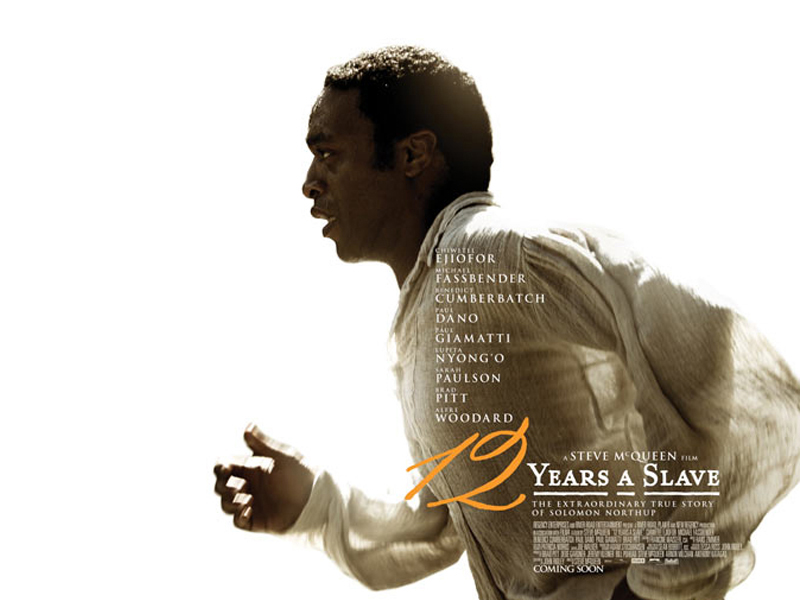 I recently saw the wonderful movie, 12 Years a Slave, directed by Steve McQueen. It is a true story and in it free negro, Solomon Northrup, played by Chiwetel Ejiofor is living in Saratoga Springs, NY where he is taken to Washington, D.C. under false pretenses, kidnapped and then sold into slavery.
I recently saw the wonderful movie, 12 Years a Slave, directed by Steve McQueen. It is a true story and in it free negro, Solomon Northrup, played by Chiwetel Ejiofor is living in Saratoga Springs, NY where he is taken to Washington, D.C. under false pretenses, kidnapped and then sold into slavery.
He then serves a series of different "masters." Near the end he is finally freed when the character, Samuel Bass, played by Brad Pitt communicates about Solomon's predicament back to his home town. Following Bass doing that at great peril to himself, a sheriff returns accompanying Mr. Parker, a shopkeeper from Saratoga Springs. When Solomon sees Mr. Parker, he can't believe his eyes and then runs up and hugs him. Solomon cries and so do we.
Then in the final scene of the movie, Solomon re-enters his home to see his wife, son, daughter, her husband, their child and his grandchild named Solomon. Solomon asks for forgiveness and the family embraces. And again they cry and we cry.
Why do movies such as 12 Years a Slave cause us to cry and when do they do that? Clearly we empathize with great suffering or great conflicts and when they are resolved and characters cry with relief, that is when we cry. But why and when we do it has more to do with our brains than our hearts.
In the late 1980's scientists discovered a region in the brains of Macaque monkeys that seemed responsible for their imitating each other's behavior. In fact they were first called, "monkey see, monkey do" neurons. In essence they caused monkeys to mirror the behavior of other monkeys. Later on these neurons were called Mirror Neurons and have been the subject of much research and investigation since they have been found to also be in humans.
Currently they are seen being involved with imitation, learning and empathy. When they are deficient or defective they also appear to be involved in autism, where affected individuals have trouble mirroring other people.
As part of my ongoing work as a practising psychotherpist vs. researcher, I have repeatedly observed that many people feel that they are mirroring or conforming to the real demands from the world and the emotional and psychological needs of other people. And the more they do that, the more it creates a mirror neuron hunger to be mirrored and cared about in return.
When these people perceive themselves as conforming and caring more about others than vice versa, that creates a Mirror Neuron Gap (which I first introduced in my book, "Just Listen" Discover the Secret to Getting Through to Absolutely Anyone).
The wider the gap the more that eliminating it or at least reducing it becomes a leitmotif to many things they do.
In a movie such as 12 Years a Slave, the Mirror Neuron Gap was dramatically created when Solomon wakes up in chains after he has been intoxicated into a drunken stupor. The gap rapidly widens further when he is beaten by one of the men holding him captive.
Throughout the movie, there are many instances of the gap being widened and then slightly reduced whenever we see compassion between characters. And the compassion is mostly by Solomon for others and rarely from others to him.
Bass' character gives him a taste of it when Solomon makes his request that Bass alert people back in Saratoga Springs. But it is in the scene when he first lays eyes on Mr. Parker that we are grabbed by the tear ducts and we just let it flow. And if that wasn't enough, we then get a booster shot when Solomon is reunited with his family.
Yes, the reason we cry may be about empathy, compassion and a feeling of hope suddenly replacing despair. However what underlies it is that in one instant what had been a huge Mirror Neuron Gap is suddenly eliminated and in that moment of its being eliminated we are overwhelmed with a feeling of wholeness or completeness. This takes the takes the place of that tragedy and tumolt we felt throughout the movie leading up to it. And it's in that immense relief from and (at least temporary) resolution to our incompleteness and des-pair (i.e. feeling unpaired with a world that we care about, but doesn't care about us) that we spontaneously cry.
********
Also if you're looking for a couple more Mirror Neuron Gap closers and reasons to grab a kieenex check out:
- Field of Dreams - "Want to have a catch?"
- As Good as It Gets - "You make me want to be a better man?"